Introduction
Artificial intelligence (AI) will stand as a pivotal digital marketing trend in 2024, reshaping the landscape of modern marketing. Its integration has far-reaching implications, revolutionising traditional strategies and equipping marketers with a powerful arsenal of tools to enhance efficiency and effectiveness.
It is impossible to overestimate the importance of AI in today’s marketing environment. It sparks creativity, enabling marketers to break through traditional barriers and seize previously unheard-of opportunities. With the use of AI, marketers can now analyse enormous datasets, glean insightful information, and make data-driven decisions that maximise the impact of their campaigns.
The transformation brought about by AI extends across a spectrum of tools, each designed to address specific facets of marketing. From content creation and optimisation to personalised targeting and social media management, these tools represent a paradigm shift in how businesses engage with their audiences.
This blog serves as a comprehensive exploration of various AI tools for marketing applications. By providing insights into the functionality and significance of these tools, the goal is to equip marketers with a nuanced understanding of their potential benefits and challenges.
Although incorporating AI into marketing offers previously unheard-of benefits, it also raises important issues that should be carefully considered. The possibility of an over-reliance on AI raises serious concerns as it may cause marketing initiatives to become less personal. To stay authentic and build real connections with the audience, the correct balance between human creativity and automated processes must be struck.
The significance of responsible AI adoption is further enhanced by ethical considerations. Given their influence on marketing strategies, AI technologies must be ensured to adhere to ethical standards. The need for a deliberate and ethical approach to AI implementation is highlighted by concerns about algorithmic bias, data privacy, and the possibility of unforeseen consequences.
It is essential to address these issues head-on to create a marketing environment where ethical responsibility and technological innovation coexist harmoniously.
Benefits of Using AI Tools for Marketing
- Enhanced Efficiency:
AI plays a pivotal role in enhancing the efficiency of marketing processes, automating repetitive tasks, and empowering marketers to dedicate more time to strategic decision-making. This efficiency boost is instrumental in shaping a seamless customer experience and optimising digital marketing strategies. - Data-Driven Insights:
AI’s prowess in analysing vast datasets yields actionable insights that go beyond surface-level observations. Marketers benefit from a deeper understanding of customer behaviour, enabling them to make informed decisions and tailor personalised campaign strategies that resonate with the target audience. - For businesses looking to elevate their strategy, leveraging digital marketing services | digital marketing services | can amplify the impact of AI-driven insights. These services bridge the gap between data and execution, helping brands craft smarter, more targeted campaigns.
- Optimised Content Creation:
AI tools shine in the realm of content creation, not just automating the process but also optimising it for relevance and resonance. This optimisation contributes to a more engaging customer experience and ensures that content aligns seamlessly with the preferences of the target audience. - SEO Optimisation:
Leveraging AI for SEO tasks goes beyond enhancing website visibility; it’s a strategic move to improve search engine rankings. This optimisation is key to driving organic traffic and enhancing the overall customer experience by ensuring that users find relevant content easily. - Personalisation and Targeting:
AI’s ability to facilitate precise customer segmentation is a game-changer for personalised marketing. Tailored email campaigns, targeted ads, and customised content delivery enhance the customer experience by providing valuable and relevant interactions. - Chatbots and Virtual Assistants:
The implementation of AI-driven chatbots transforms customer engagement by providing instant support and information. These automated assistants not only handle repetitive tasks efficiently but also contribute to a seamless and responsive customer experience. - Social Media Management:
In the realm of social media, AI tools assist marketing teams in scheduling posts, conducting social listening, and gaining insights for strategic decision-making. This not only streamlines tasks for the marketing team but also ensures that social media campaigns resonate effectively with the target audience.
Marketing Analytics and Optimisation
AI-powered analytics tools bring real-time data analysis to the forefront, allowing marketers to track campaign performance and derive actionable insights. This data-driven approach is pivotal in optimising digital marketing strategies, ensuring they align with customer behaviour and preferences.
Top Categories of AI Tools for Marketing
Content Creation:
- Content Generation and Copywriting: AI tools, such as OpenAI’s GPT-3, can autonomously generate human-like text, improving content creation efficiency. Copywriting tools like Writesonic use AI to produce compelling ad copy and engaging content.
- SEO Optimisation: Platforms like MarketMuse leverage AI to analyse search patterns and optimise content for improved SEO performance. Additionally, tools like Yoast integrate AI to provide real-time SEO suggestions for content.
- Content Idea Brainstorming and Research: AI-driven tools like BuzzSumo help marketers identify trending topics and keywords, guiding content creation strategies. SEMrush’s Topic Research tool utilises AI to generate content ideas based on user interests and industry trends.
Design and video creation:
Visual Content Enhancement: Adobe’s Sensei uses AI to enhance visual content, improving image quality and web design elements. Video creation tools like Lumen5 utilise AI to transform text into engaging video content with dynamic visuals.
Personalisation and Targeting:
- Customer Segmentation and Audience Insights: AI platforms like Segment analyse customer data to create precise segments, aiding in personalised targeting. Customer data platforms, such as BlueConic, use AI to provide deep insights into user behaviour for targeted marketing.
- Personalised Email Marketing Campaigns and Ad Campaigns: Email marketing tools like Mailchimp employ AI to personalise email content based on user behaviour and preferences. Ad platforms like Google Ads use AI algorithms to optimise ad targeting for better engagement.
Social media management
- Scheduling and Posting Across Platforms: Tools like Buffer use AI to optimise the scheduling of social media posts for maximum reach and engagement. Hootsuite employs AI to automate social media postings based on user engagement patterns.
- Social Listening and Competitor Analysis: Brandwatch utilises AI to monitor social media platforms for brand mentions and conduct competitive analysis. Socialbee employs AI-driven analytics to provide insights into competitor strategies and industry trends.
- AI-Powered Content Suggestions and Engagement Strategies: AI tools like CoSchedule’s Headline Analyzer suggest content topics and engagement strategies based on user behaviour. Social media platforms like Facebook use AI to recommend engagement strategies and content types for higher visibility.
Marketing Analytics and Optimisation
- Data Analysis and Reporting: Google Analytics uses AI to analyse website data, providing comprehensive reports and actionable insights. Tableau‘s AI-driven analytics tools offer in-depth data analysis for marketing performance assessment.
- Marketing Campaign Performance Tracking and Optimisation: AI platforms like Optimizely provide real-time tracking of marketing campaigns, allowing for immediate optimization. HubSpot‘s AI features assist in analysing campaign performance and suggesting improvements.
Predictive Analytics and Forecasting: IBM Watson Analytics utilises AI for predictive analytics, forecasting future trends and user behaviour. Salesforce Einstein incorporates AI to predict campaign outcomes and guide strategic decision-making
10 AI Tools for Marketing

- Jasper (formerly Jarvis):
- Key Features: AI-powered tool for streamlining the content creation process. Generates various content formats, is optimised for SEO, and provides multiple writing styles.
- Cost: Premium, with monthly and annual plans, offering a basic plan for diverse content generation needs.
- Integration: Jasper seamlessly integrates with various marketing platforms and content management systems to enhance its online marketing.
- Customisation: Provides control over content style, tone, and voice, aiding in creating compelling material for potential customers.

- Rytr
- Key Features: An AI writing tool that simplifies the content creation process by generating various formats, translating languages, and crafting different creative text formats.
- Cost: free plan with limited features; premium plans for more extensive usage, catering to various budget constraints.
- Customisation: Rytr offers some control over content length, tone, and creativity level, contributing to valuable insights for diverse content needs.
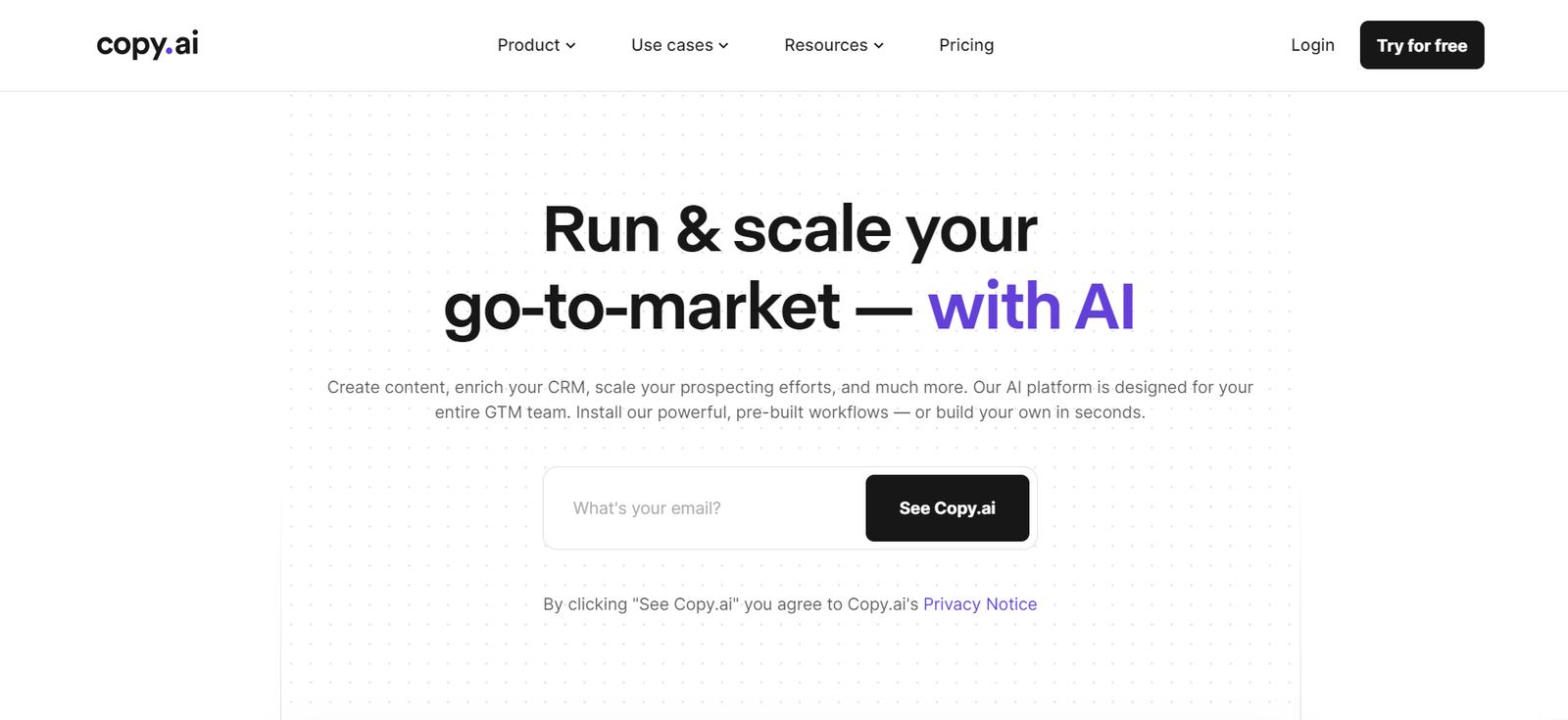
- CopyAI
- Key Features: Tailored for the content creation process, this AI tool generates various marketing copy formats, optimising them for search engine optimisation (SEO) and providing creative writing features.
- Cost: free plan with limited features; premium plan offering expanded functionality for specific content needs.
- Integration: Seamlessly integrates with select marketing and advertising platforms, offering AI-driven insights to enhance conversion rates.
Customisation: CopyAI provides limited customisation options compared to some competitors but is effective for ad and landing page copywriting.

- Writesonic
- Key Features: Writesonic is a versatile AI tool catering to the content creation process, generating various marketing copy formats, translating languages, and facilitating long-form content creation.
- Cost: free plan with limitations; premium plans offer more features and higher limits, providing good value for diverse content needs.
- Integration: Integrates with some marketing platforms and content management systems, enhancing your online presence.
- Customisation: Offers control over content style, tone, and voice to some extent, contributing to personalised content for potential customers.

- Looka
- Key Features: Simplifying the content creation process, this AI tool creates logos, business cards, and other brand assets, strengthening your online presence.
- Cost: free plan with limited features; premium plans for additional downloads; providing high value for basic design needs.
- Customisation: Looka offers limited customisation options compared to professional design software but caters to basic design requirements.
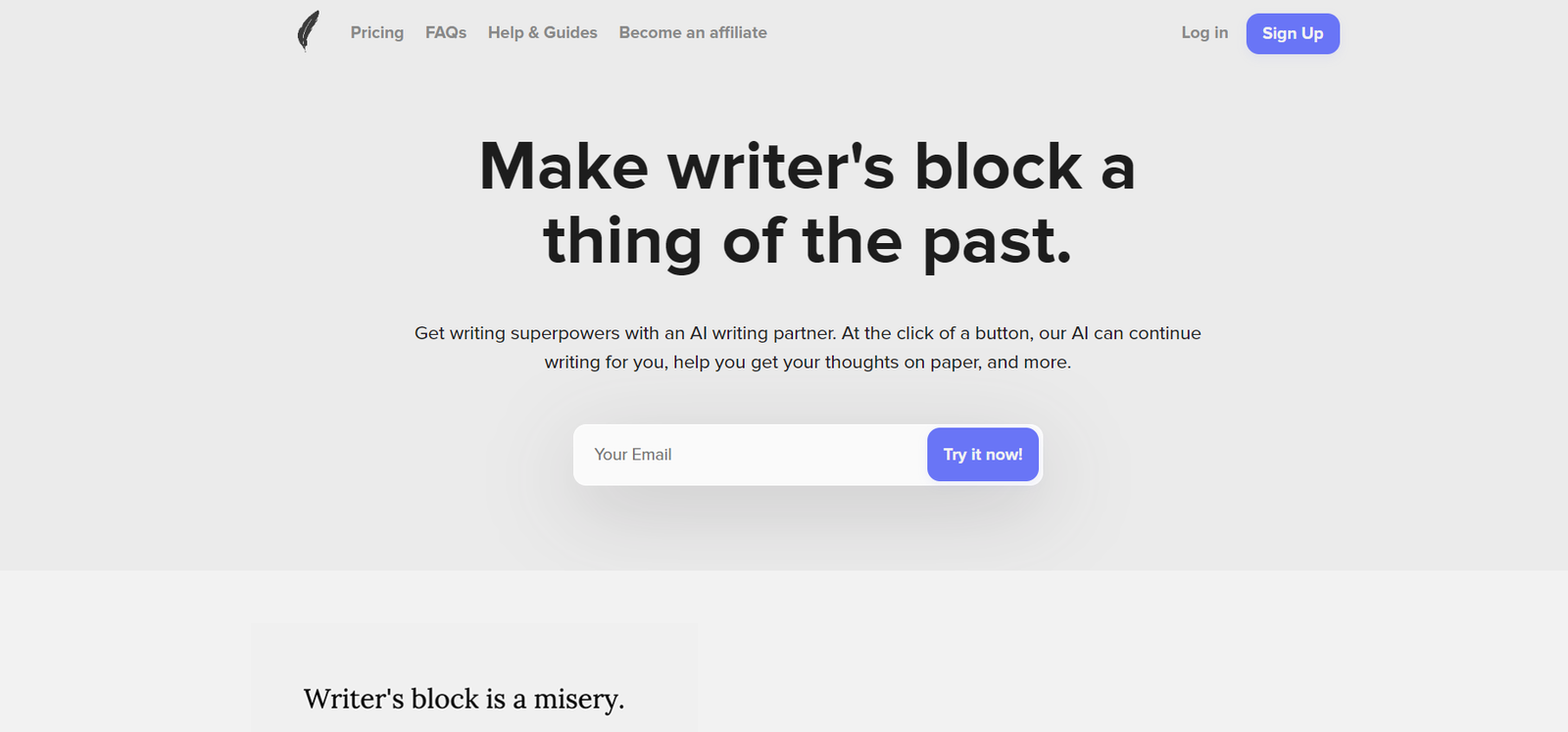
- ShortlyAI
- Key Features: Focused on the content creation process, this AI tool generates blog posts, articles, and other long-form content, streamlining the creation of engaging material.
- Cost: free plan with limited features; premium plans offer more features and higher limits, contributing to valuable insights for diverse content needs.
- Integration: integrates with some content management systems, aiding in the seamless inclusion of AI-generated content in your online presence.
Customisation: ShortlyAI offers control over content length, tone, and level of detail, ensuring personalised content for potential customers.
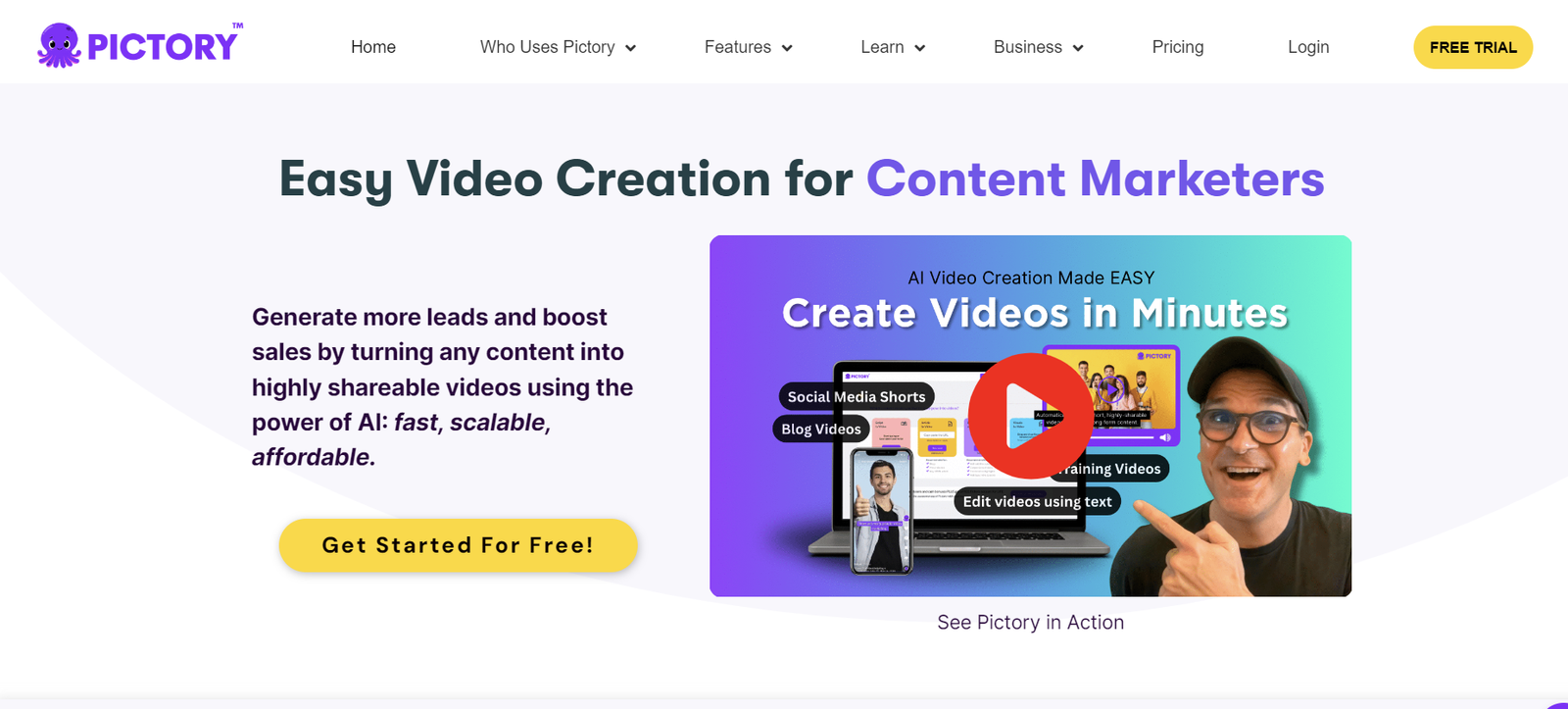
- PictoryAI
- Key Features: Enhancing the content creation process, this AI tool converts text into engaging short videos, providing pre-made templates and editing tools for compelling social media posts.
- Cost: free plan with limited features; premium plans for more features and higher limits, offering moderate cost-effectiveness for short video creation.
- Integration: integrates with some social media platforms, contributing to an impactful social media marketing strategy.
Customisation: Pictory offers some control over video style, music, and voiceover, ensuring personalised content for potential customers.
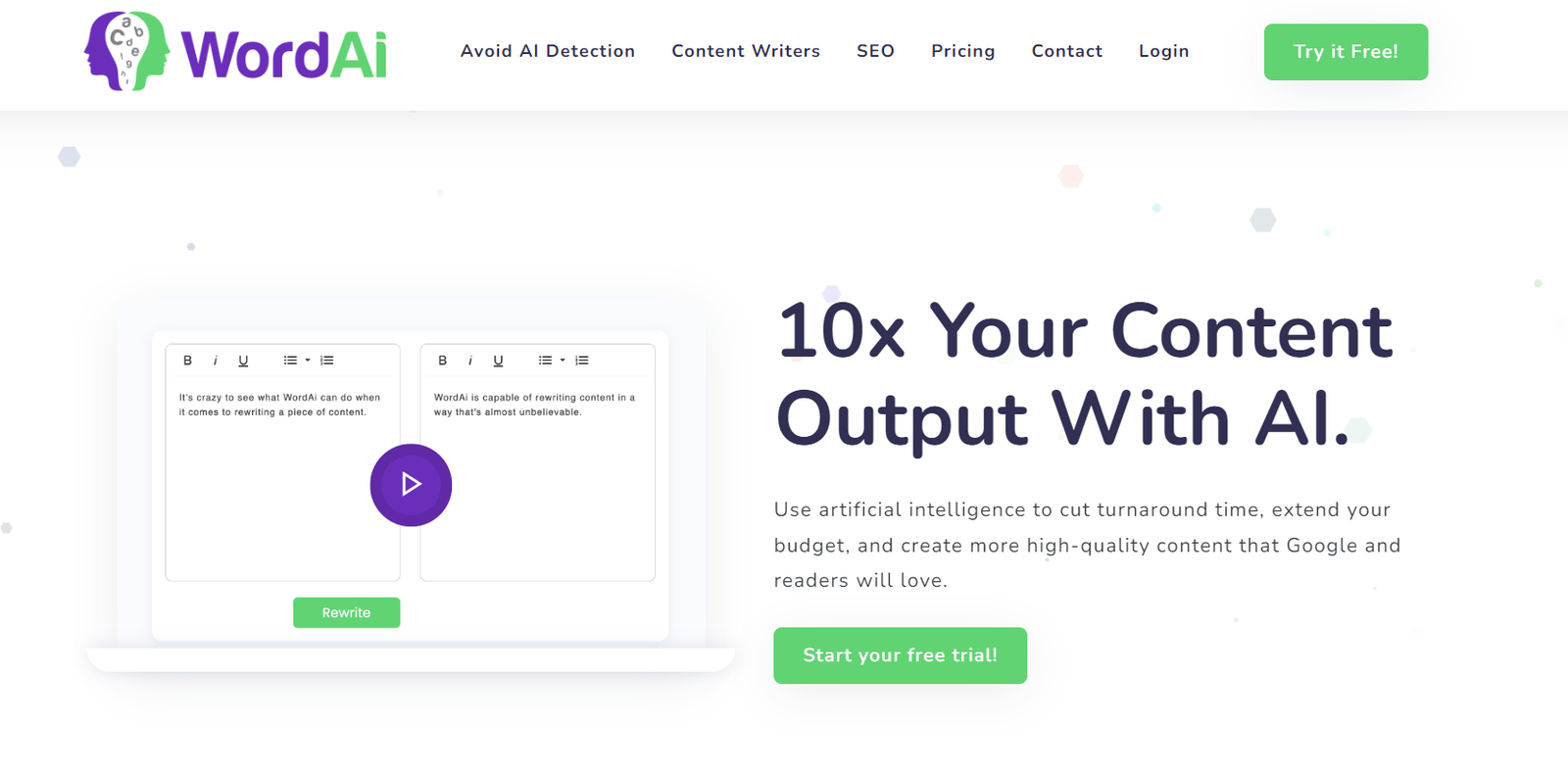
- WordAI
- Key Features: Focused on refining existing content, this AI tool rewrites and paraphrases, checks for plagiarism, and optimises content for readability, enhancing the content creation process.
- Cost: free plan with limited features; premium plans for additional functionality; offering high cost-effectiveness for basic content needs.
Integration: Currently, WordAI provides limited integration options, with a focus on improving the content creation process.
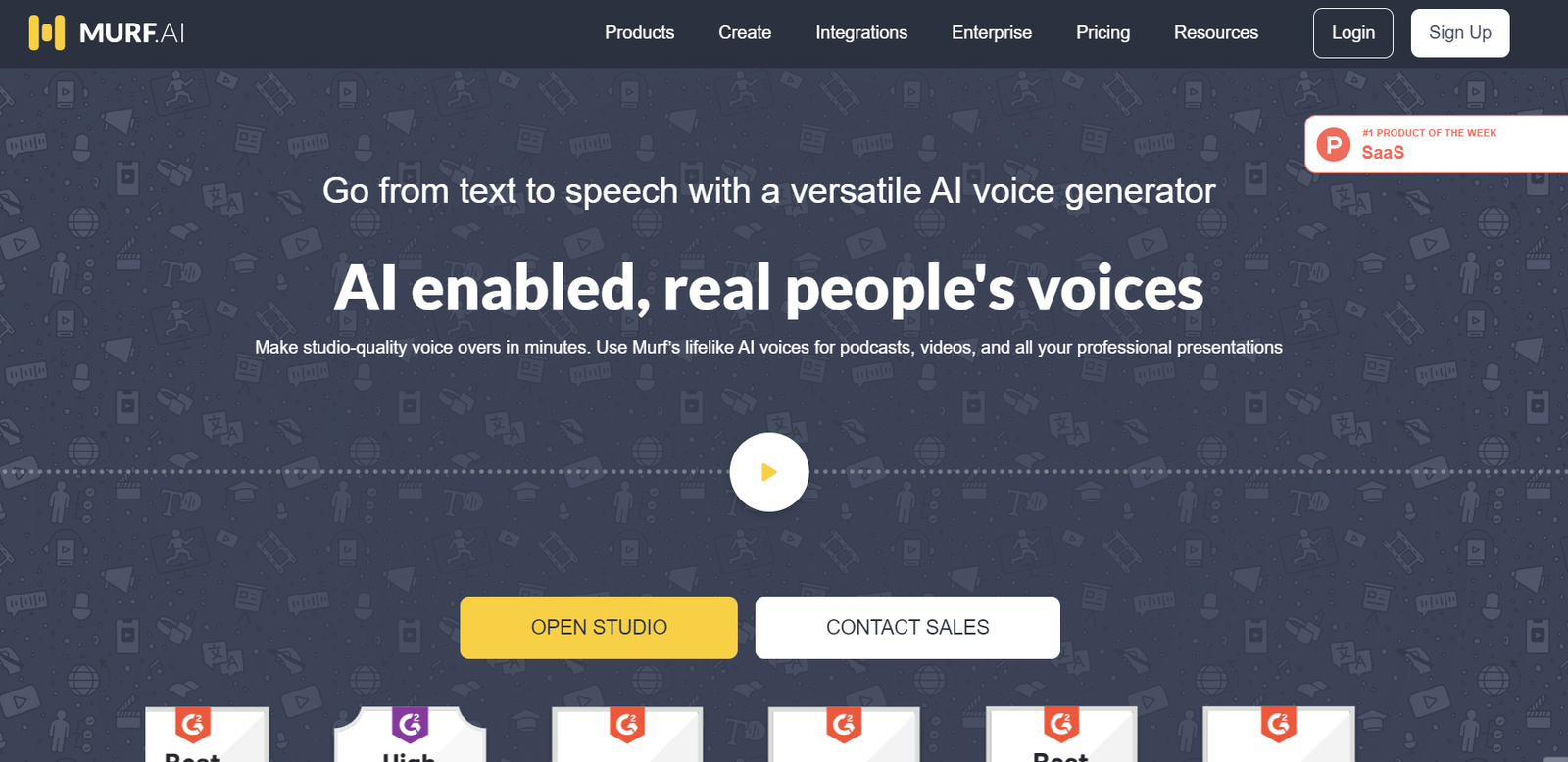
- Murf AI
- Key Features: Specialising in voice-overs, this AI tool generates high-quality, human-sounding voice-overs in multiple languages, contributing to the content creation process for various formats.
- Cost: Freemium (limited features, short audio), paid plans starting at $19/month, offering moderate cost-effectiveness for professional-sounding voiceovers.
- Integration: integrates with various video editing and Google marketing tools, enhancing the content creation process for online platforms.
Customisation: Murf AI offers control over voice style, tone, and pace for voice overs, ensuring personalised content for potential customers.
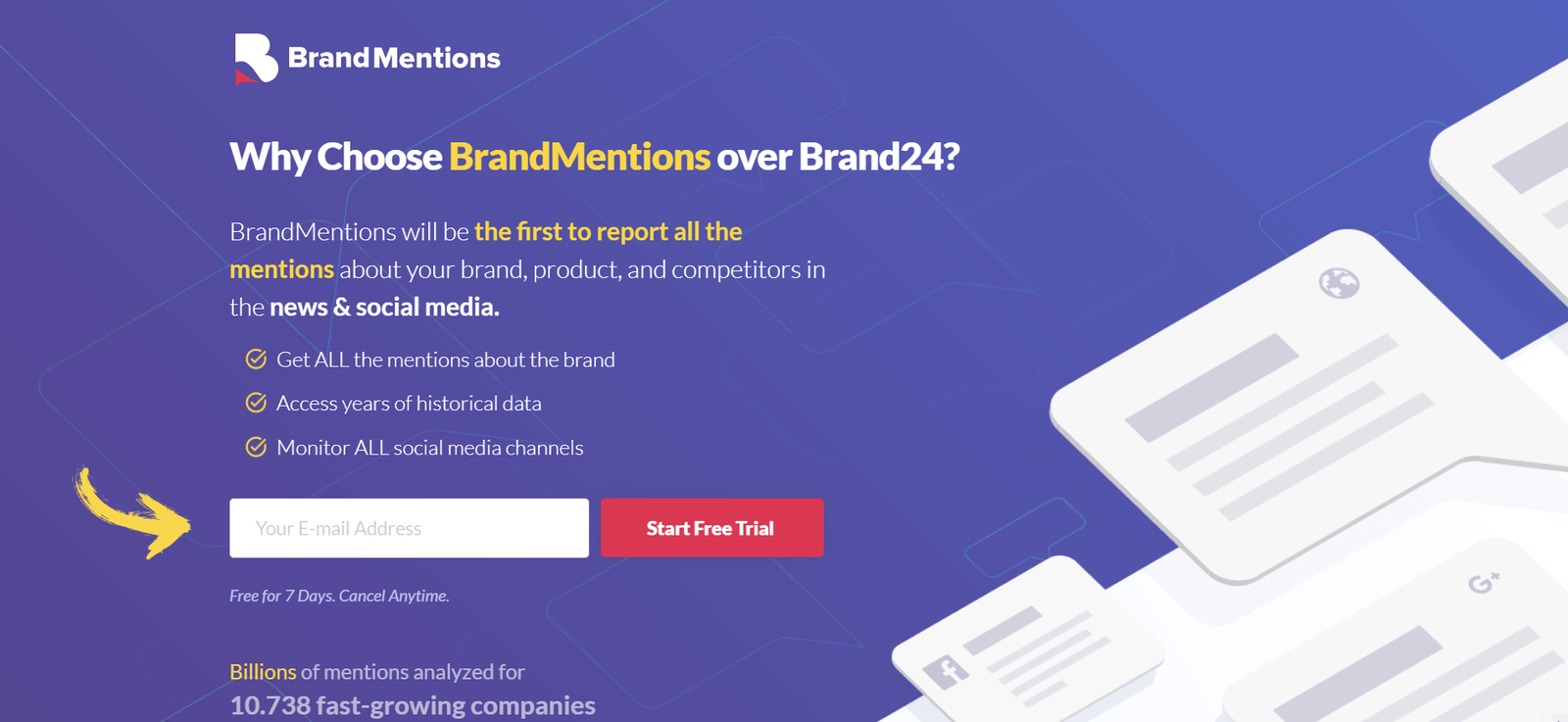
- Brand24
- Key Features: Focused on monitoring and improving online presence, this AI tool tracks social media mentions, gauges brand sentiment, and identifies influencers, contributing valuable insights to enhance the content creation process.
- Cost: Freemium (limited features), paid plans starting at $49/month, providing moderate cost-effectiveness for social media listening and competitive intelligence.
- Integration: Integrates with various social media platforms and marketing tools, ensuring a comprehensive approach to enhancing your online presence.
- Customisation: Brand24 allows setting up custom monitoring parameters and alerts, tailoring insights to specific content strategies and potential customer needs.
These AI-powered tools contribute significantly to the content creation process, search engine optimisation, and overall online presence, providing valuable insights to engage potential customers and optimise conversion rates.
How do you choose the best AI tools for marketing?

Selecting the right AI tools for marketing is a critical step in maximising the benefits of these technologies. The following advice will assist you in making wise choices:
- Identify your specific needs.
- Define Objectives: Clearly outline your marketing goals and objectives. Whether it’s improving content creation, enhancing social media management, or optimising analytics, knowing your specific needs will guide tool selection.
- Consider Industry Requirements: Different industries may require unique functionalities. For example, Scalenut might be more beneficial for content-focused industries, while social media-centric industries may prioritise tools like Buffer or Hootsuite.
- Evaluate features and capabilities.
- Content Amplification Tools: Assess the features of content amplification tools like Frase AI, focusing on capabilities such as content optimisation, user intent analysis, and research functionalities.
- Social Media Management Tools: Compare features between Buffer vs Hootsuite, considering factors like scheduling, social listening, and AI-powered content suggestions.
- Integration with Existing Systems
Compatibility: Ensure the selected tools seamlessly integrate with your existing marketing stack. Compatibility with platforms like Buffer and Hootsuite ensures a cohesive and efficient workflow.
- User-Friendly Interface
Ease of Use: Prioritise tools with user-friendly interfaces. Frase AI, Buffer, and Hootsuite’s intuitive designs contribute to smoother adoption and utilisation within your marketing team.
- Budget Considerations
Cost-Effectiveness: Evaluate the cost-effectiveness of each tool, considering your budget constraints. Frase AI, Duplichecker, and social media management tools like Buffer and Hootsuite offer various pricing plans, allowing flexibility based on your needs.
- Trial Periods and User Feedback
- Utilise Trials: Take advantage of trial periods offered by tools like Frase AI, Duplichecker, Buffer, and Hootsuite. This allows hands-on experience, helping you assess whether the tools align with your requirements.
User Reviews: Consider user reviews for insights into practical experiences with each tool. Real-world feedback can provide valuable perspectives on the usability and effectiveness of Fraser AI, Duplichecker, and social media management tools.
How do you use AI tools for marketing effectively?
To unlock the full potential of AI marketing tools, it’s imperative to strategically approach their integration into your marketing workflows. Employ these key practices for effective implementation:
- Strengthen existing marketing skills.
- Supplement, Don’t Replace: Consider AI tools, such as Frase AI and Duplichecker, as supplements to your existing marketing skills. Rather than replacing human creativity, they enhance and streamline certain tasks.
- Skill Development: Invest time in understanding the functionalities of AI tools. Training your team on tools like MarketMuse ensures they can effectively leverage machine learning capabilities for customer inquiries and additional features.
- Maintain human oversight and boost creativity.
- Strategic Decision-Making: While AI facilitates data-driven decisions, human oversight remains paramount. Tools like Frase AI can inform strategies but rely on human intuition for nuanced decision-making in your digital marketing campaigns.
- Creative Input: Ensure AI-generated content undergoes a creative review process. Human input adds a personal touch, aligning the final output with your brand voice and enhancing customer satisfaction.
- Ensure data quality and address biases.
- Data Validation: Regularly validate data quality, whether using AnyWord for content analysis or analytics tools for campaign tracking. Accurate data is crucial for meaningful insights and optimising SEO-optimised content.
- Address biases: Be vigilant about biases in AI algorithms. Regularly review and refine tools like Clearscope to minimise biases, ensuring fair and ethical practices in your content marketing efforts.
- Monitor and analyse performance.
- Continuous Monitoring: Regularly monitor the performance of AI-driven campaigns using tools like Zapier, Hubspot, or Semrush. Consistent evaluation allows for timely optimisation and enhances customer satisfaction.
- Data-Driven Adjustments: Leverage analytics tools for data-driven adjustments. Tools like Buffer and Hootsuite provide insights that inform strategic changes, optimising your digital marketing campaigns within the constraints of your marketing budget.
By prioritising these practices, you not only maximise the effectiveness of AI marketing tools but also establish a harmonious balance between technological innovation and human expertise. This synergy is crucial for achieving sustainable and impactful results in your wide-ranging digital marketing efforts.
Conclusion
As we conclude our exploration into the transformative realm of AI in marketing, let’s recap the key insights and emphasise the potential of AI tools to revolutionise your marketing efforts responsibly. We have looked into a variety of AI tools, including Frase AI for content optimisation, Duplichecker for SEO improvement, and social media management platforms like Buffer and Hootsuite. Each tool contributes uniquely to the way marketers strategize and interact with their audiences.
AI is more than just a technological advancement; it is a catalyst for innovation. Emphasise how artificial intelligence (AI) can have a big impact on decision-making, process optimisation, and marketing performance overall.
Instead of taking the place of human skills, AI tool integration enhances them. Make sure AI technologies are used responsibly, address biases, and think about the moral implications.
Lastly, I urge readers to use AI’s potential in their marketing endeavours in a responsible manner. There is still more to be discovered about cutting-edge techniques and tools in this transformative journey. Maintain success over time by continuously assessing and improving tactics while utilising a wide variety of AI tools.
Frequently Asked Questions (FAQ) :
AI tools are not likely to completely replace marketing experts, even though they provide sophisticated features and insights. Rather, they increase effectiveness and efficiency. By using AI to handle tasks like data analysis and campaign optimisation, marketers can free up more time for human creativity and strategic planning when creating high-quality content.
Artificial intelligence (AI) tools can greatly enhance your marketing strategy by automating tedious tasks and offering in-depth insights. These tools improve decision-making and expedite workflows with an intuitive interface. Personalised experiences for your audience and efficient budget allocation are possible when AI is integrated into your business plan.
Digital marketing AI tools provide several features to improve outcomes and expedite procedures. AI is used by marketers for tasks like predictive analytics, content optimisation, and audience segmentation. They can automate content creation and produce consistent, high-quality results with little assistance from humans by utilising generative AI tools.
Indeed, creating email campaigns with AI tools can be very beneficial. Marketers use AI-driven analytics to understand audience preferences and behaviour, enabling personalised email marketing strategies. With AI-powered content generation and optimisation, they can create engaging emails that resonate with recipients, ultimately driving conversions and ROI.
AI marketing tool prices vary according to the supplier, features, and degree of complexity. While some basic AI tools might be inexpensive or free to use, more sophisticated tools with a wider range of features might require a substantial financial outlay. To choose the best AI tools for their purposes, marketers should carefully consider their budget and business plan.
There are many different career options available to marketers who use AI. Professionals can specialise in areas like AI-driven analytics, predictive modelling, and content optimisation thanks to the integration of AI into digital marketing tools. Marketers can develop their abilities and further their careers in the dynamic field of digital marketing by utilising AI to produce personalised experiences and generate outcomes.










